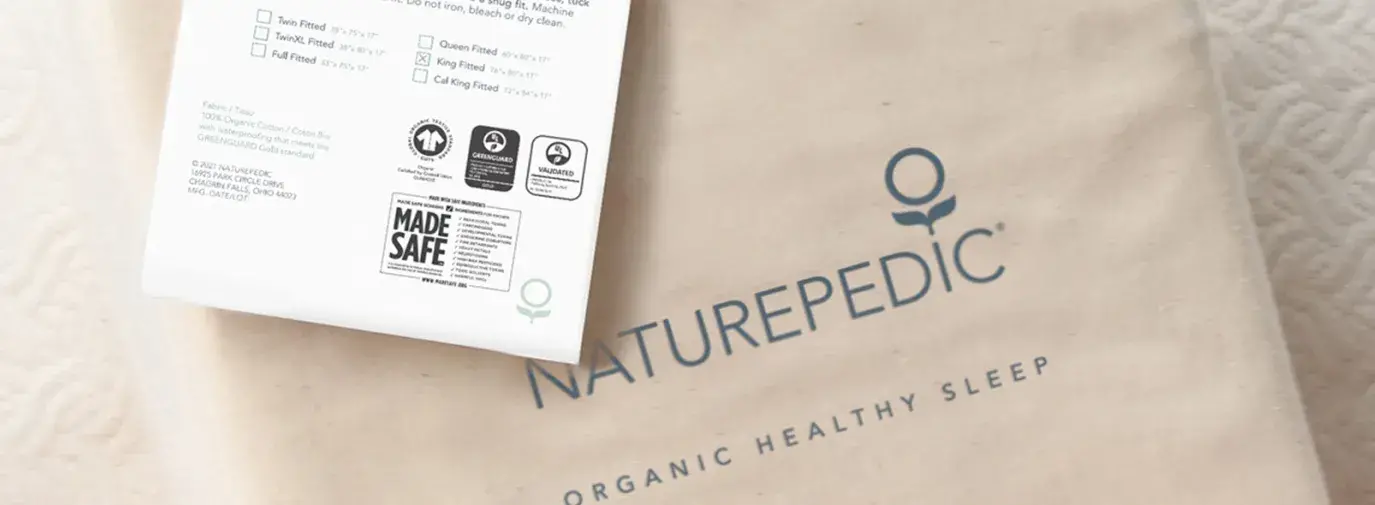Guest Blog from Green Business Network Leader Naturepedic
Eco-friendly, green, sustainable … ever see a word so many times that it starts to lose its meaning? Have you seen clothing made from “recycled materials” but no information on what those are? How about “all-natural” skincare products?
Without qualifying these words, terms like “green” mean … well, not a whole lot. The rise in eco-conscious behavior from consumers has brought with it a marketing tactic known as greenwashing, which can make it hard to consume mindfully.
In the organic mattress industry where Naturepedic operates, we frequently see this happen when companies tout materials like soybean foam or eco-foam. Sounds great, right? Until you do your research and discover that soybean foam can contain as little 3-5% soy content. It’s not uncommon for these “friendlier” foams to consist of off-gassing petrochemicals.
Similarly, take a closer look at bamboo sheets before you let the word “bamboo” win you over. Bamboo fabrics can have environmental benefits, but that varies quite a bit depending on how the bamboo is processed.
So, how can you avoid falling for greenwashing? And will you need a degree in chemistry? Naturepedic can help.
What is Greenwashing?
Greenwashing is a deceptive marketing tactic designed to foster the belief that a company is doing more to protect the environment than it really is. It often involves making false or misleading claims and can include:
- Advertising
- Public relations
- Mission and vision statements
- Packaging
- Alleged partnerships
Have you heard of a lie of omission? Withholding information that reflects poorly on a company is a form of greenwashing, too.
7 Common Greenwashing Tactics
Greenwashing can be as simple as using vague, undefined terms, like “green” or “sustainable,” but it can also be more complicated. Watch out for these greenwashing tactics.
1. Lack of Certifications
Always look for third-party certifications and verifications when vetting a company or product. The Global Organic Textile Standard (GOTS) and MADE SAFE® are some you can trust.
2. Fake Endorsements
You'll see this trick a lot with terms like “100% Natural.” Companies create graphics that resemble an official seal or emblem … but don't have any official organization associated with them.
3. Red Herrings
Some companies claim their products are free of a toxic chemical that isn't typically used in their type of product anyway. Or, they promote not using a chemical that has been legally banned. In rhetoric, this is referred to as a red herring, and you see it as a red flag.
4. Deceptive Imagery
Lush forests, sparkling streams, untouched beaches – websites, packaging and marketing materials often use gorgeous, natural images to convey an inflated sense of eco-friendliness. Look beyond the images and read the ingredient labels.
5. The Lone “Green” Product
It’s important to look at manufacturing companies. What else do they make? If their other products contain toxic chemicals, there's a good chance that their “green” option is manufactured at the same factory … and susceptible to cross contamination.
7. Hidden Partnerships and Investment
Look into what other companies this brand is associated with. For example, do they produce certified products but invest in endeavors that cause pollution? If they're just after the sales, anything's free game.
How to Vet Companies for Sustainability
It seems like everyone is hopping on the green wave, so who’s sincere? Always consider the following questions when researching companies:
- Do they belong to environmental organizations and advocacy groups?
- Do they have reputable, third-party certifications?
- Have they been mentioned in third-party reports?
- Are they transparent about what's in their products?
And lastly, check if they've recently published a sustainability report. At Naturepedic, we aren't just committed to organic products, but also to the transparency that comes with them. As a part of this effort, we invite you to view our 2022 Sustainability Report to see our progress and to help you consume as ethically as you can.
Naturepedic is proud to be a certified member and Leader of the Green Business Network at Green America.




